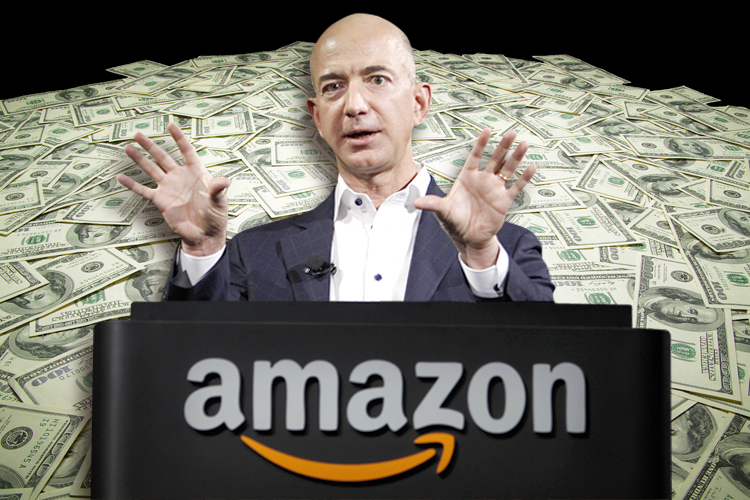If you are an author, how can you possibly defend Amazon? In their ongoing contract dispute, Amazon is punishing Hachette by disappearing their author’s books, delaying shipping, and directing customers away from titles by recommending others instead.
In response, hundreds of prominent writers joined together to send an open letter to Amazon protesting their thuggish tactics.
However, not all writers are on the same page. A few have come forward to say that they have Amazon’s back. The most vocal is Hugh C. Howey, whose self-published sci-fi novel “Wool” has sold a half-million copies on Amazon. In an article in today’s New York Times, Howey defended Amazon and characterized Ursula Le Guin’s statement that Hachette’s tactics amount to censorship as “mostly lying.”
Mostly lying? That’s the equivalent of “a little pregnant.”
Howey, like most writers who are Amazon defenders, is a self-published genre writer. (And he has become the Times’ go-to author to predictably take Amazon’s side; yesterday’s piece was at least the fifth he has been quoted in since the end of May 2014.) The most elite among the romance, fan-fiction and sci-fi writers can do quite well on Amazon—according to Slate, self-published titles made up 25 percent of the top-selling books on Amazon in 2012. This bank is good news for Howey and company, but at what ultimate cost?
By getting in bed with a rapacious efficiency, a corporation that prides economy over artistry, profits over people, they are no better than Ayn Rand libertarians who decry sales taxes and then complain about how underfunded their local public schools are. There are several other analogies one could use, such as selling your land rights to a fracking company. You may get a mountain of cash, but your land is poisoned. Oh, well, let future generations deal with the cleanup. In a spectacular bit of short-sightedness, Howey complained to the Times that independent bookstores “blacklist my books.”
So, let me get this straight—you would like your books, which are published by the company whose avowed goal is to eliminate brick and mortar stores of any kind, to be carried in the same brick and mortar stores your publisher is trying to destroy?
Maybe Howey needs to be reminded that Amazon is the company that notoriously squeezes the little guy. They instituted the “Gazelle Program” to “deal” with small publishers. Oh, you are thinking, how cute, swift gazelles! No, Amazon aimed to isolate wounded small publishers — then hammered them with ruthless terms. This is the company that relentlessly fights local sales taxes, has horrible warehouse conditions, and introduced an app that would let you scan a book in a bookstore then order it from Amazon at a discount. This is the company that would like to have complete vertical integration, where they publish and sell all books, eliminating rival publishers, bookstores, along with anyone who works in publishing.
What is particularly galling to book lovers is that Bezos really could care less about books. As super-agent Andrew Wylie put it, “Amazon is nothing more than a trucking company, a digital truck company.” In his book, “The Everything Store: Jeff Bezos and the Age of Amazon,” Brad Stone explains how books were just a gateway, a testing ground for selling everything from shoes to salamis. According to George Packer’s thorough and sobering New Yorker profile of Amazon, the company now makes $5.25 billion on book sales, only about 7 percent of the company’s $75 billion in total yearly revenue. This is chump change to Amazon, yet this amount still accounts for half the book sales in this country. Many, like Salon’s Richard Eskow and now Franklin Foer, writing in the New Republic, have begun to argue that Amazon is close to establishing a monopoly, and that it’s high time the Justice Department to step in and deal with the monster they’ve helped create through inaction.
Books are not widgets. They are art and ideas. They have lasting cultural value beyond immediate sales. Publishing is a community, an ecosystem where we all contribute so that it not only survives, but thrives. Howey and company are eschewing community for efficiency. And, for now, they are reaping the financial rewards. One has to wonder though, will Howey and company still be making bank once Amazon is the only game in town? Or will Howey and his cohorts find their profits diminished when Amazon, not needing to compete with other publishers, sets whatever terms they would like. What happens when the only books that exist are being published and sold by Amazon? When the only forum to discuss the merits of any book is on GoodReads, which is owned by Amazon? Ethically, do you want to do business with a company that is capitalism at its very worst?
According to Forbes, Jeff Bezos is now the 20th richest person in the world, worth $30.2 billion. He got there by being the most ruthlessly efficient seller our country has ever known. But think of all the bodies that have been trucked over along the way—the hundreds of bookstores and publishing houses, not to mention the tens of thousands of writers who have been squeezed by shrinking margins. In the end, you are judged by the company your keep.

